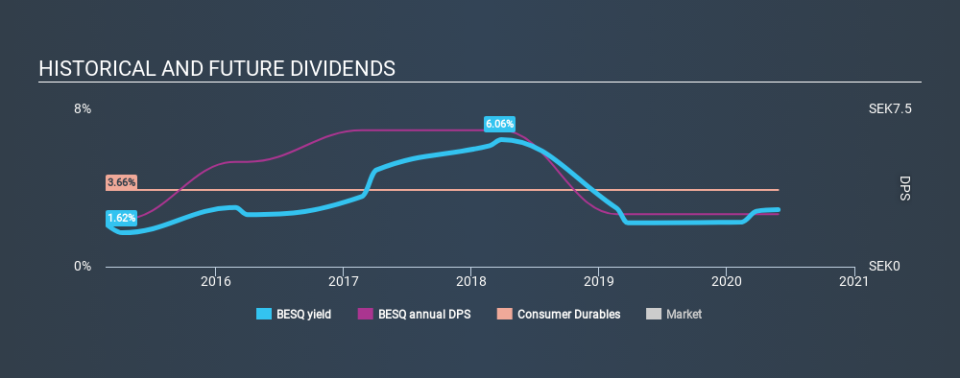Does It Make Sense To Buy Besqab AB (publ) (STO:BESQ) For Its Yield?

Could Besqab AB (publ) (STO:BESQ) be an attractive dividend share to own for the long haul? Investors are often drawn to strong companies with the idea of reinvesting the dividends. Unfortunately, it's common for investors to be enticed in by the seemingly attractive yield, and lose money when the company has to cut its dividend payments.
With a 2.7% yield and a five-year payment history, investors probably think Besqab looks like a reliable dividend stock. A low yield is generally a turn-off, but if the prospects for earnings growth were strong, investors might be pleasantly surprised by the long-term results. Remember that the recent share price drop will make Besqab's yield look higher, even though recent events might have impacted the company's prospects. Before you buy any stock for its dividend however, you should always remember Warren Buffett's two rules: 1) Don't lose money, and 2) Remember rule #1. We'll run through some checks below to help with this.
Explore this interactive chart for our latest analysis on Besqab!
Payout ratios
Dividends are usually paid out of company earnings. If a company is paying more than it earns, then the dividend might become unsustainable - hardly an ideal situation. So we need to form a view on if a company's dividend is sustainable, relative to its net profit after tax. Looking at the data, we can see that 77% of Besqab's profits were paid out as dividends in the last 12 months. Paying out a majority of its earnings limits the amount that can be reinvested in the business. This may indicate a commitment to paying a dividend, or a dearth of investment opportunities.
We also measure dividends paid against a company's levered free cash flow, to see if enough cash was generated to cover the dividend. Last year, Besqab paid a dividend while reporting negative free cash flow. While there may be an explanation, we think this behaviour is generally not sustainable.
Is Besqab's Balance Sheet Risky?
As Besqab has a meaningful amount of debt, we need to check its balance sheet to see if the company might have debt risks. A rough way to check this is with these two simple ratios: a) net debt divided by EBITDA (earnings before interest, tax, depreciation and amortisation), and b) net interest cover. Net debt to EBITDA measures total debt load relative to company earnings (lower = less debt), while net interest cover measures the ability to pay interest on the debt (higher = greater ability to pay interest costs). Besqab has net debt of 15.36 times its EBITDA, which we think carries substantial risk if earnings aren't sustainable.
We calculated its interest cover by measuring its earnings before interest and tax (EBIT), and dividing this by the company's net interest expense. Besqab has interest cover of more than 12 times its interest expense, which we think is quite strong. Despite a decent level of interest cover, shareholders should remain cautious about the high level of net debt. Rising rates or tighter debt markets have a nasty habit of making fools of highly-indebted dividend stocks.
Consider getting our latest analysis on Besqab's financial position here.
Dividend Volatility
Before buying a stock for its income, we want to see if the dividends have been stable in the past, and if the company has a track record of maintaining its dividend. Looking at the data, we can see that Besqab has been paying a dividend for the past five years. During the past five-year period, the first annual payment was kr2.25 in 2015, compared to kr2.50 last year. This works out to be a compound annual growth rate (CAGR) of approximately 2.1% a year over that time. The dividends haven't grown at precisely 2.1% every year, but this is a useful way to average out the historical rate of growth.
Modest growth in the dividend is good to see, but we think this is offset by historical cuts to the payments. It is hard to live on a dividend income if the company's earnings are not consistent.
Dividend Growth Potential
With a relatively unstable dividend, it's even more important to evaluate if earnings per share (EPS) are growing - it's not worth taking the risk on a dividend getting cut, unless you might be rewarded with larger dividends in future. Besqab's EPS have fallen by approximately 13% per year during the past five years. With this kind of significant decline, we always wonder what has changed in the business. Dividends are about stability, and Besqab's earnings per share, which support the dividend, have been anything but stable.
Conclusion
To summarise, shareholders should always check that Besqab's dividends are affordable, that its dividend payments are relatively stable, and that it has decent prospects for growing its earnings and dividend. Besqab gets a pass on its dividend payout ratio, but it paid out virtually all of its cash flow as dividends. This may just be a one-off, but we'd keep an eye on this. Earnings per share are down, and Besqab's dividend has been cut at least once in the past, which is disappointing. There are a few too many issues for us to get comfortable with Besqab from a dividend perspective. Businesses can change, but we would struggle to identify why an investor should rely on this stock for their income.
Companies possessing a stable dividend policy will likely enjoy greater investor interest than those suffering from a more inconsistent approach. Meanwhile, despite the importance of dividend payments, they are not the only factors our readers should know when assessing a company. Just as an example, we've come accross 5 warning signs for Besqab you should be aware of, and 2 of them shouldn't be ignored.
Looking for more high-yielding dividend ideas? Try our curated list of dividend stocks with a yield above 3%.
Love or hate this article? Concerned about the content? Get in touch with us directly. Alternatively, email editorial-team@simplywallst.com.
This article by Simply Wall St is general in nature. It does not constitute a recommendation to buy or sell any stock, and does not take account of your objectives, or your financial situation. We aim to bring you long-term focused analysis driven by fundamental data. Note that our analysis may not factor in the latest price-sensitive company announcements or qualitative material. Simply Wall St has no position in any stocks mentioned. Thank you for reading.


